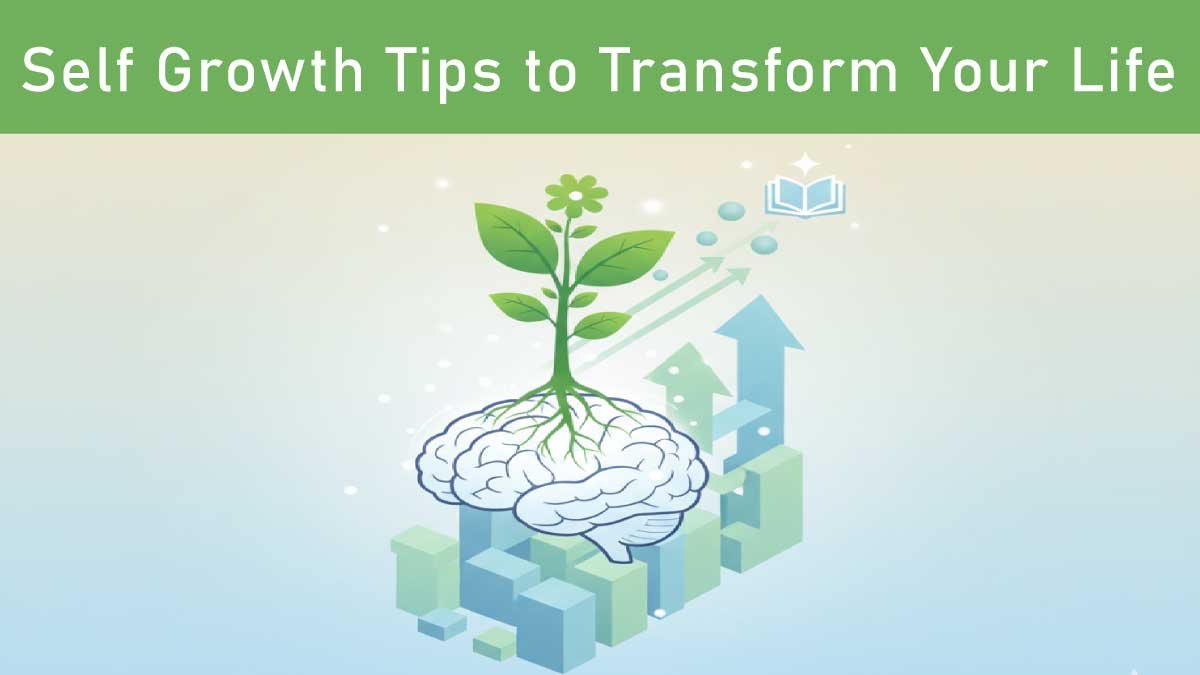Every person desires to become better, to live with more purpose, and to reach their fullest potential. The journey of self growth, also called personal development or self-improvement—is about embracing change, learning new things, and building habits that help you evolve into the best version of yourself.
But self-growth doesn’t happen overnight. It’s not a quick fix or a checklist that you can complete in one weekend. Instead, it’s a lifelong journey made up of small daily choices that compound into lasting transformation. The good news? You don’t have to do everything at once. By taking small, consistent steps, you can make meaningful progress every single day.
Below, we will explore 15 powerful self-growth tips, with practical advice and examples you can apply to your own life.
1. Start With Self-Awareness
The first step in self-growth is understanding yourself. Without self-awareness, you are like a ship sailing without a compass. Take time to reflect on your values, strengths, weaknesses, and motivations.
Try this exercise: spend 10 minutes each evening writing in a journal about your day—what went well, what you struggled with, and how you felt in certain situations. Over time, you’ll start to notice patterns. Maybe you get easily frustrated when you’re tired, or perhaps you feel most alive when you’re helping others.
Self-awareness doesn’t mean criticizing yourself; it means understanding yourself. Once you know your patterns, you can make conscious choices that align with who you truly are.
2. Set Clear and Achievable Goals
Without goals, growth can feel vague and overwhelming. Instead of saying, “I want to be successful,” define what success means to you. For one person, success might mean financial independence; for another, it could be having strong relationships or better health.
Break your goals into smaller, measurable steps. For example, if your goal is to improve fitness, don’t just say “I’ll exercise more.” Instead, set a goal like “I’ll work out three times a week for 30 minutes.” This makes your progress trackable and achievable.
Small wins create momentum. Every time you hit a goal, no matter how small, you’ll build confidence and motivation to keep going.
3. Embrace Lifelong Learning
Self-growth thrives on learning. The moment you stop learning, you stop growing. Fortunately, we live in a world where information is more accessible than ever.
Start by reading books that challenge your perspective. If you usually read fiction, try a biography, a psychology book, or something related to your career. Consider taking online courses, attending workshops, or even listening to podcasts while commuting.
Learning doesn’t have to be formal—it can be as simple as learning how to cook a new dish, picking up a new language, or exploring a hobby. Each new skill you learn expands your confidence and opens doors to new opportunities.
4. Step Out of Your Comfort Zone
Growth rarely happens in familiar spaces. If you keep doing the same things, you’ll keep getting the same results. Stepping out of your comfort zone can feel intimidating, but it’s also where transformation happens.
For example, if public speaking scares you, volunteer to give a short presentation at work. If you’ve always dreamed of traveling but feel nervous about going alone, book a short solo trip. These challenges might feel uncomfortable at first, but they’ll expand your courage and resilience.
Remember, discomfort is not danger. It’s simply the feeling of stretching yourself beyond what feels normal. Each time you face discomfort, you build new strength.
5. Build Healthy Daily Habits
Self-growth isn’t about occasional bursts of effort—it’s about what you do consistently. Your daily habits shape your future.
Start small. Drink more water, stretch for 5 minutes in the morning, or write down three things you’re grateful for. Over time, these small actions compound into massive change. For example, exercising for just 20 minutes a day may not seem like much, but over a year, it adds up to over 120 hours of movement.
The key is not to overwhelm yourself. Focus on building one small habit at a time, and once it feels natural, add another.
6. Surround Yourself With Growth-Minded People
The people you spend time with influence your mindset and habits. If you surround yourself with negative or stagnant individuals, you may find it hard to grow. On the other hand, being around growth-minded people pushes you to aim higher.
Look for mentors, supportive friends, or online communities that align with your goals. For instance, if you want to improve your health, join a fitness group. If you want to grow professionally, connect with peers in your industry.
As the saying goes, “You are the average of the five people you spend the most time with.” Choose wisely.
7. Practice Self-Discipline
Motivation can get you started, but discipline keeps you going. Self-discipline means doing what needs to be done even when you don’t feel like it.
One way to build discipline is to create systems that make good habits easier. For example:
-
Lay out your gym clothes the night before to make exercising effortless.
-
Use productivity tools to block distractions while working.
-
Set deadlines and hold yourself accountable.
Discipline is like a muscle—the more you train it, the stronger it becomes. Start with small commitments and gradually increase the challenge.
8. Take Care of Your Body
Your physical health directly affects your mental clarity, energy, and ability to grow. Without a strong foundation of health, it’s hard to focus on bigger goals.
Prioritize sleep by creating a nighttime routine that helps you wind down. Fuel your body with whole, nourishing foods rather than processed snacks. Find a form of exercise you actually enjoy—whether it’s walking, dancing, swimming, or weightlifting.
When your body feels strong, your mind functions better, and your confidence naturally increases.
9. Develop Emotional Intelligence
Self-growth isn’t just about gaining knowledge; it’s also about managing your emotions and building meaningful relationships. Emotional intelligence (EQ) helps you understand both yourself and others.
Practice active listening—give people your full attention without planning your response while they’re speaking. Learn to pause before reacting when emotions run high. Ask yourself: “What am I feeling right now, and why?”
High emotional intelligence strengthens relationships, improves communication, and reduces stress. It’s one of the most valuable skills you can develop.
10. Learn From Failures
Failure is not the opposite of growth—it’s part of it. Every mistake teaches you something that success cannot.
Instead of viewing failure as defeat, treat it as feedback. Ask: “What can I learn from this experience? What would I do differently next time?” For example, if a business idea doesn’t work out, maybe it taught you valuable lessons about marketing, timing, or audience needs.
The most successful people aren’t those who never fail—they’re the ones who refuse to give up after failure.
11. Stay Consistent, Not Perfect
Perfection is the enemy of progress. Too many people quit because they miss a day, make a mistake, or fall short of their own expectations.
Remember: consistency matters more than perfection. If you skip one workout, don’t beat yourself up—just get back on track the next day. If you fail at a new habit, start again. Progress is built through steady effort over time, not through flawless execution.
12. Practice Gratitude Daily
Gratitude is one of the simplest yet most powerful practices for self-growth. It shifts your focus from what’s lacking to what you already have.
Make it a daily habit to write down three things you’re grateful for. They don’t have to be big—something as simple as a warm cup of coffee, a kind conversation, or good health counts.
Practicing gratitude helps you develop resilience, positivity, and peace of mind. Over time, it rewires your brain to notice opportunities instead of obstacles.
13. Limit Distractions
In today’s world, distractions are everywhere—social media, endless notifications, or even our own thoughts. Self-growth requires focus, and that means learning to eliminate unnecessary distractions.
Try creating boundaries with technology. Set specific times for checking email or scrolling social media. Use apps that block distractions while you work. Declutter your environment so you can think clearly.
Every time you reduce distractions, you create space for productivity, creativity, and intentional living.
14. Invest in Yourself
The best investment you’ll ever make is in yourself. Whether it’s time, energy, or money, prioritizing your own growth pays dividends in every area of life.
Invest in courses, workshops, or tools that expand your skills. Spend money on experiences that broaden your worldview. Even something as simple as buying a good book can make a lasting impact on your journey.
Unlike material possessions, the returns of investing in yourself never fade—they stay with you for life.
15. Celebrate Your Progress
Finally, remember to celebrate how far you’ve come. Too often, we’re so focused on the next goal that we forget to acknowledge our achievements.
Celebrating doesn’t mean throwing a big party—it can be as simple as recognizing your effort, rewarding yourself with a break, or sharing your win with a friend.
Acknowledging your growth keeps you motivated and reminds you that self-growth is not about the destination—it’s about the journey.
Final Thoughts
Self-growth is not about becoming someone else—it’s about becoming the best version of who you already are. It’s a lifelong process of learning, unlearning, and evolving. Some days you’ll make big strides, and other days you’ll feel stuck, but what matters most is that you keep moving forward.
Start today. Pick one or two tips from this list and put them into practice. With time, patience, and consistency, you’ll look back and see just how far you’ve come.
The journey may be long, but remember: the best project you’ll ever work on is yourself.
FAQs on Self-Growth
What is self-growth and why is it important?
Self-growth is the process of improving yourself through learning, self-awareness, and healthy habits. It’s important because it helps you unlock your potential, build resilience, and create a more meaningful life. Without self-growth, it’s easy to feel stuck, but with it, you continuously evolve into a better version of yourself.
How do I start my self-growth journey?
Start by practicing self-awareness—reflect on your values, strengths, and weaknesses. Then set clear, realistic goals and work on building small daily habits like journaling, exercising, or reading. Focus on consistency rather than perfection. Begin with one or two positive changes and expand gradually. Over time, these simple steps will create powerful, lasting growth.
What are some daily habits that support self-growth?
Daily habits like journaling, practicing gratitude, exercising, reading, and mindful reflection all support self-growth. These small actions might feel simple, but they compound over time and bring massive results. Even dedicating ten minutes daily to learning something new or improving a skill helps you grow. The key is staying consistent, not perfect.
How can failures contribute to self-growth?
Failures are not setbacks but steppingstones for growth. Each mistake provides valuable lessons about what works and what doesn’t. Instead of viewing failure as defeat, see it as feedback. Reflect on what went wrong, adjust your strategy, and try again. People who grow the most are those who learn from their failures.
Can self-growth improve relationships?
Yes, self-growth directly improves relationships. As you develop emotional intelligence, learn empathy, and manage your emotions better, your interactions with others become healthier. Self-growth helps you listen actively, resolve conflicts with patience, and build deeper connections. When you grow as an individual, you bring more positivity, balance, and understanding into your relationships.
How do I stay motivated in my self growth journey?
Motivation fades, but consistency keeps you going. Create systems like routines, reminders, or accountability partners. Celebrate small wins to stay inspired. Surround yourself with positive, growth-minded people who encourage progress. Remember your “why”—the reason you started in the first place. When you focus on steady progress instead of perfection, motivation naturally follows.

Hassan Chaudhry is a poet and writer who explores healing, self-growth, and everyday inspiration. His words come from real experiences and honest reflections — written to heal hearts, spark hope, and remind readers that every moment is a new beginning. He is the creator of Poems Nest, a space where poetry and positivity come together to inspire hearts.

